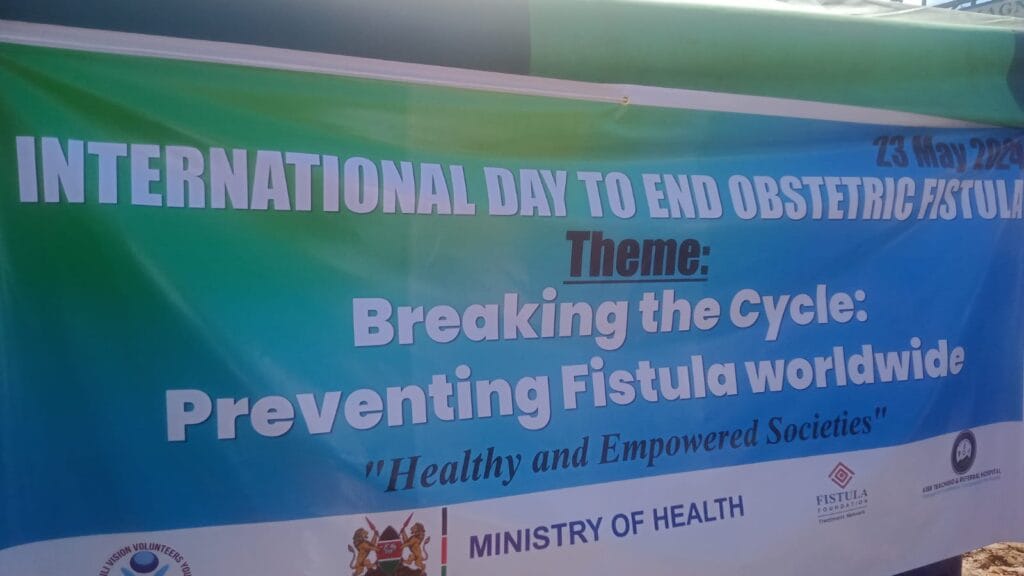Fistula survivors in Kisii celebrate journey to recovery as world marks obstetric fistula day

Source: Capital FM Kenya
Author: Rosemary Onchari
KISII, Kenya, May 24 - As the world marked obstetric fistula day whose theme was ' overcoming barriers to provide more treatment,' obstetric fistula survivors in Kisii came out in large numbers to create awareness on the need to eliminate fistula which remains a significant public health issue in African countries.
These Women had an opportunity at Daraja Mbili market to raise awareness about the causes, consequences, and prevention of obstetric fistula by sharing their experiences and calling out women with fistula to seek medical treatment.
Lilian Moraa, a survivor while narrating her journey towards recovery said, she developed obstetric fistula when she gave birth to her second born without knowing her condition, saying she took it lightly like a tear while giving birth and she was optimistic she will recover in three days' time.
"after I was discharged ,the condition worsened oozing of blood from my birth canal increased ,I also discovered I couldn't t control my short and long calls," Moraa said.
Moraa was scared even to share with her husband about the changes in her body, she isolated herself and didn't want to share with anyone fearing stigmatized and even losing her marriage and she even hard an odor.
Her husband sat her down and he tried to inquire why the odor and the isolation from everyone, she opened up and explained on her body changes, before they could make a step to the hospital, she discovered she was pregnant for the third born.
Anyway, they went and consulted the doctor and they discovered it was obstetric fistula." with the fear of carrying pregnancy and seeking fistula treatment made me worried and the risk to my unborn child, I decided to wait till I gave birth to go for treatment.
Roseline Mongare another survivor said, she developed fistula while giving birth to her last born son. She came to discover this after she was discharged, she couldn't control her short call.
"I gained courage and told my husband who called the nurse who had attended to me while giving birth, he was advised to accompany me for tests and treatment," she stated.
Moraa and Roseline are among hundreds of women who are members of Daraja mbili vision which advocates for public health issues and she is at the forefront of creating awareness on elimination of obstetric fistula in the Kisii community.
These women say, they are living a normal life and carrying out their daily activities like others in the community without fear or isolating themselves.
"I am able to attend merry-go-round meetings, I can join other women during celebrations and even perform wifely duties because I healed from this condition," she said.
Everline Kwamboka, an officer at Daraja Mbli vision said they are targeting women and youth to improve public health in this community including obstetric fistula treatment, HIV/AIDS, Tuberculosis gender based violence and many more.
"We are happy to share with our survivors and give hope to those who are isolating themselves fearing stigma from those around them," said Kwamboka.
She noted they are giving free treatment and care to the victims through the global fund and partners with fistula foundation to restore dignity in Women.
She added that with all these challenges, women with similar conditions still don't come out for treatment due to myths and misconception and stigmatization linked to fistula.
"We have reached out to 1,700 women in the community and they come out following our awareness on through the media and make it a secret," Kwamboka stated.
Kisii county Director of Medical services Matiko Giyabe said they have worked closely with gynecologists and nurses in healthcare facilities to ensure women developing this condition are attended in time.
"We also conduct free medical camps and call out women with this condition to come and seek medical condition to restore their dignity," he stated.
He noted the county government has ensured that every woman has the opportunity to experience safe and dignified childbirth.
Victor Moseti, a gynecologist stated that this condition often results from prolonged or obstructed labor without timely medical intervention, leading to a hole between the birth canal and either the bladder or rectum.
"Seeking medical treatment early enough and preventing prolonged labor during child birth can prevent obstetric fistula," he said.
According to United Nations Population fund, thousands of women still endure the devastating consequences of obstetric fistula annually.
This childbirth injury, resulting from prolonged and obstructed labor, is not just a medical issue but a reflection of systemic inequalities ingrained within societies.
Over the past two decades, UNFPA has supported 140,000 fistula repair surgeries; over 12,000 women and girls received social reintegration support between 2018 and 2023.
World health Organization (WHO) indicates 50,000 to 100,000 women and girls are affected by fistula yearly. The development of obstetric labor is directly linked to major causes of maternal mortality.



